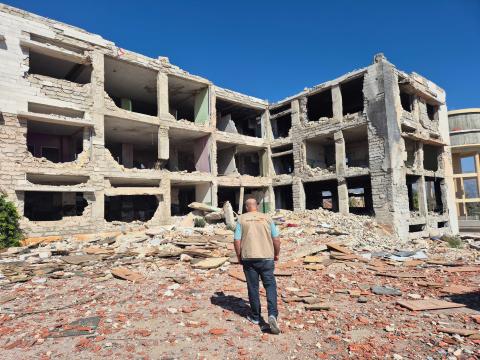Lebanon Crisis: Two Years On, 1.4M Children Risk Long-Term Harm

13 October 2025 – It's been two years since hostilities escalated in South Lebanon and World Vision launched the Middle East Crisis Response. Humanitarian needs remain high in the country.
- Over 1.4 million children face disrupted education, deteriorating mental health, and heightened protection risks.
- 82,632 people remain displaced; many unable to return due to damaged homes and infrastructure, and access restrictions in border areas.
- In certain areas, a survey found that more than 50% of children under two years old are in food poverty. Nationwide, 30% of children under 18 years old had eaten one meal or less the day before the survey.
- Nearly half of public schools were converted into shelters, delaying academic years for 1.5 million students. Over 300 schools sustained partial or full damage.
World Vision Lebanon is urging the international community to keep Lebanon in focus, as more than 1.4 million children remain at serious risk amid multiple global crises. With a population of just 5.8 million people, an estimated 4.1 million people in the country now need humanitarian assistance. The scale of need far exceeds current resources as Lebanon’s Flash Appeal remains severely underfunded by US$ 208.9 million, stalling essential recovery and prolonging human suffering.
“We must take action now to secure a safe and peaceful future full of hope and opportunity for all Lebanon’s children,” said Heidi Diedrich, national director of WV Lebanon. “That means that no child should go to bed hungry or miss another day of school. That means we must adequately address the trauma these children continue to face, supporting their mental health and healing,” Diedrich added.
The October 2023 escalation exacerbated humanitarian needs on the heels of Lebanon’s multiple crises since its economic collapse of 2019 and the Beirut blast in 2020. Despite the November 2024 cessation of hostilities, near-daily strikes continue to devastate South Lebanon and the country’s central Beqaa Valley, exposing thousands of children and their families to further trauma and displacement.
As one of the first frontline humanitarian responders, World Vision Lebanon’s impact over the past two years includes:
- 589,468 people directly reached, including 217,898 children, across sectors including WASH, protection, food security, education, and cash assistance.
- 10,222,802 meals distributed to families affected by displacement and food insecurity.
- Essential items distributed, including 13,958 blankets and 10,774 thermal blankets, family hygiene kits for 61,224 individuals, and 12,886 mattresses to ensure safety and dignity.
- Rehabilitation of schools, homes, Primary Health Care Centers, and damaged infrastructure to restore essential services and safe environments.
- Psychosocial support delivered to 11,662 children to address trauma and support healing.
World Vision urges the international community to close the critical funding gap, while prioritising the needs of children – particularly in education, protection, nutrition, and mental health – to safeguard their well-being and future. Reconstruction must be transparent and inclusive, focusing on restoring homes, schools, water systems, and healthcare infrastructure. Finally, long-term investments in social cohesion and community resilience are vital to rebuild what has been lost and to break the cycle of recurring crises.
“As the global humanitarian need continues to strain a system that is going through enormous transformation, it is vital that our children – those who are most affected by any such crisis – continue to receive the love, care, and critical support they need to flourish and experience a peaceful, abundant future,” said Diedrich.
Note to editors
World Vision Lebanon (WVL) has been operating in Lebanon since 1975, delivering long-term development and humanitarian assistance across the country. Our work focuses on key sectors including Education, Child Protection, Livelihoods, Water, Sanitation and Hygiene (WASH), Food Security, Health and Social Cohesion.
For more information, please contact:
Heidi Diedrich, National Director at World Vision Lebanon: heidi_diedrich@wvi.org
Maya Bou Nassar, Communications and Advocacy manager at World Vision Lebanon: maya_bounassar@wvi.org